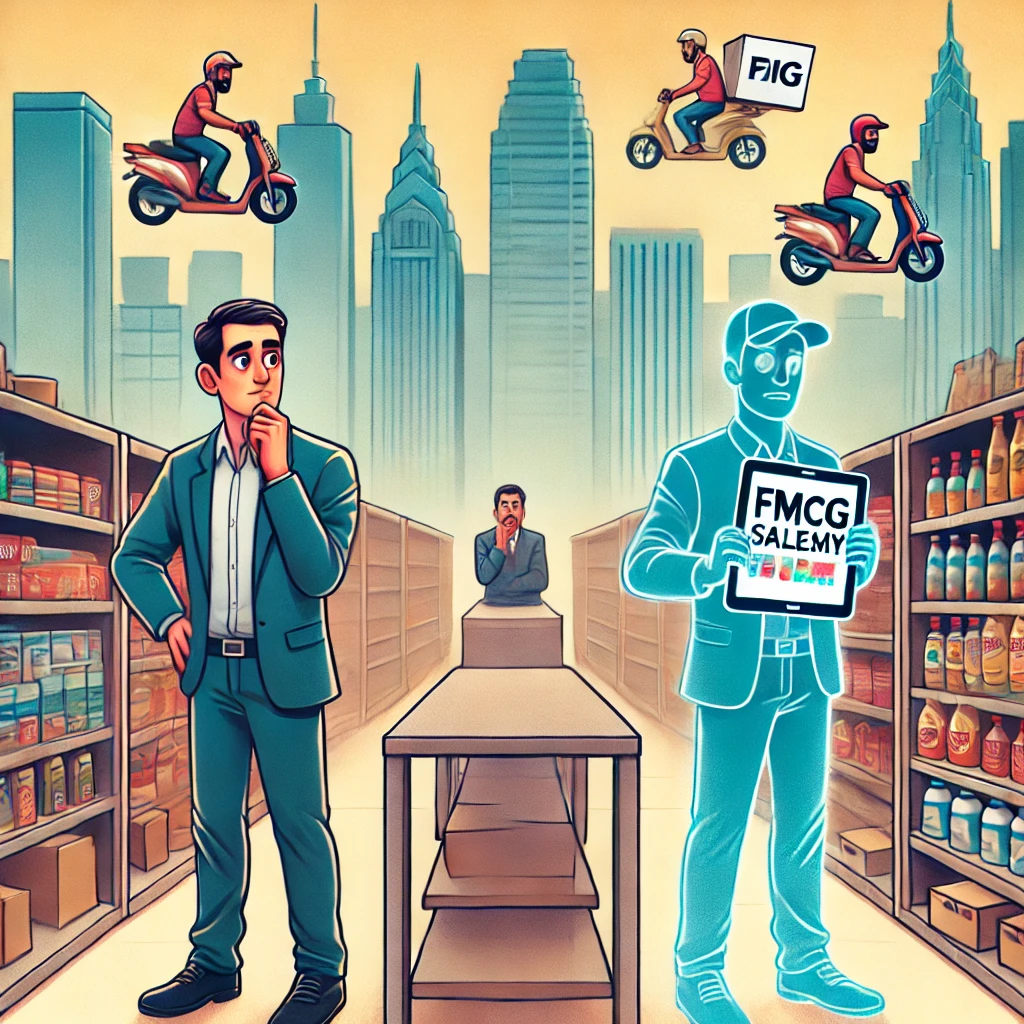
The Indian Fast-Moving Consumer Goods (FMCG) industry is experiencing a unique and unexpected challenge. It’s not a supply chain disruption, product recall, or social media backlash. It’s something far more fundamental—the alarming shortage of salesmen. The backbone of retail sales, these foot soldiers of consumer brands, are vanishing at an unprecedented rate. Why? Because the gig economy has reshaped employment opportunities, offering flexibility, independence, and fewer door-to-door rejections.
The Great Salesmen Disappearance: What’s Happening?
Historically, FMCG companies relied on an army of salesmen to roam the streets, armed with product catalogs and persuasive skills. Their mission was clear: convince retailers to stock their products. However, in today’s digital age, with quick-commerce apps and gig jobs offering lucrative opportunities, these retail warriors are quitting in droves.
It’s a classic case of ‘swiping right’ for better job prospects. With platforms like Swiggy, Zomato, and Blinkit offering flexible hours and competitive pay, traditional sales jobs appear outdated. The FMCG industry must now rethink its sales strategies to adapt to this shift.
Why Are Salesmen Leaving FMCG Jobs?
1. The Gig Economy Effect
Why walk the streets in sweltering heat to sell products when you can deliver food and groceries while enjoying flexible hours? The gig economy provides instant earnings, quick payouts, and the freedom to choose work schedules. This makes the traditional FMCG sales grind far less appealing.
Gig jobs eliminate the pressure of meeting rigid monthly targets. Sales roles in FMCG, on the other hand, demand persistence, resilience, and extensive travel. The gig economy offers an alternative where individuals control their work-life balance.
2. Rise of Digital Sales & E-commerce Growth
E-commerce and B2B marketplaces have revolutionized retail sales. Retailers can now order directly through mobile apps, with real-time inventory updates and AI-powered recommendations. This digital transformation has reduced reliance on traditional sales representatives.
Businesses like Udaan, Jiomart, and Amazon have streamlined order placements, making personal sales visits redundant. Instead of dealing with salesmen, retailers prefer self-service digital platforms that provide better efficiency and convenience.
3. Changing Workforce Aspirations & Job Market Trends
The younger workforce prioritizes flexibility, work-life balance, and technology-driven careers. Traditional sales roles, often demanding and physically exhausting, no longer appeal to today’s job seekers.
Millennials and Gen Z prefer roles that involve remote work, digital engagement, and career growth opportunities. The FMCG industry must recognize these changing aspirations and redesign sales roles to attract new talent.
Impact on the FMCG Industry: Who’s Feeling the Heat?
1. Small Retailers & Local Kirana Stores
Local shop owners still rely on salesmen for product updates, discount schemes, and new product launches. Without regular visits from sales reps, they may miss out on crucial business insights, leading them to switch to brands that offer better digital support.
Fewer sales reps mean shopkeepers struggle to stock the right mix of products, impacting consumer choices. This disruption can hurt brand loyalty and retail partnerships, pushing more businesses toward digital-first solutions.
2. FMCG Companies & Retail Distribution
With fewer sales reps pushing products, securing shelf space in local stores has become a battle of digital marketing rather than human persuasion. Traditional distribution networks must innovate, integrating tech-driven solutions to compensate for the lack of on-ground sales personnel.
FMCG brands must rethink their go-to-market strategy, balancing online and offline sales approaches to ensure continued success.
3. Consumers & Retail Shopping Trends
Consumers may experience inconsistent stock availability at local stores due to a weakened supply chain. The absence of sales representatives means fewer in-store promotions and direct brand engagement, which can impact customer purchase decisions.
The retail experience may shift toward an automated, self-service model, reducing human interactions and altering traditional shopping habits.
Can AI and Tech Save the Day?
With the decline of human sales reps, can artificial intelligence (AI) and technology bridge the gap? Many FMCG brands are investing in AI-driven sales strategies to adapt to this workforce shift.
1. AI-Powered CRM Tools & Predictive Analytics
AI tools help businesses analyze retailer demand, purchase patterns, and automate order placements. Advanced predictive analytics enable FMCG companies to optimize supply chains and reduce dependency on manual tracking.
AI-driven customer relationship management (CRM) tools enhance engagement, ensuring retailers receive timely product recommendations and promotional offers.
2. WhatsApp & AI Chatbots for Sales Engagement
WhatsApp-based ordering systems and AI chatbots are transforming sales interactions. Automated chatbots provide real-time assistance, order updates, and product suggestions, bridging the gap between brands and retailers.
These solutions enable seamless communication, reducing the reliance on traditional sales visits.
3. Virtual Sales Assistants & Digital Sales Transformation
FMCG companies are experimenting with virtual sales assistants that replicate the role of a traditional salesman in a digital format. These AI-powered tools ensure smooth information flow, promotional offers, and stock management without the need for physical sales representatives.
The Way Forward: Adapt or Struggle
The FMCG industry must adopt a hybrid approach—leveraging digital tools while retaining essential human engagement. Brands that embrace digital ordering systems, incentivize traditional sales roles, and offer flexible structures will successfully navigate this crisis.
Solutions for FMCG Companies to Navigate the Crisis
1. Invest in Tech-Driven Sales Models
Implement AI, automation, and predictive analytics to enhance sales operations. Digital transformation will help companies stay ahead of market trends and streamline distribution.
2. Offer Competitive Incentives
Flexible commission structures and hybrid work models may help attract and retain sales talent. Sales roles must evolve to provide a mix of digital and field operations.
3. Enhance Digital Ordering & Support
Strengthen online ordering platforms with dedicated customer support for retailers. Seamless digital solutions will ensure smooth transactions and better retailer engagement.
Conclusion: The FMCG Sales Revolution
The FMCG industry is undergoing a transformation. The traditional sales model is being disrupted by the gig economy, digital sales platforms, and AI-driven automation. Companies that fail to adapt will struggle, while those embracing change will lead the future of FMCG sales.
Key Takeaways:
- The gig economy offers better flexibility and earnings, making FMCG sales roles unattractive.
- E-commerce and AI-driven solutions are reducing reliance on traditional salesmen.
- Retailers need tech-driven solutions to stay connected with brands.
- FMCG companies must innovate their sales strategies to remain competitive.
